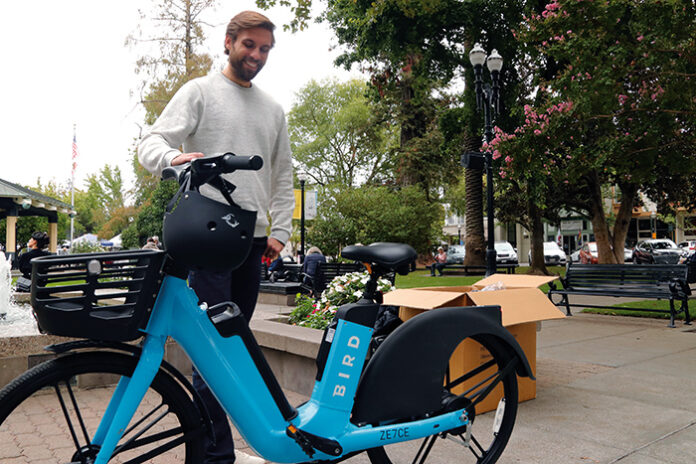
It wasn’t that long ago that the City of Healdsburg welcomed a bike-sharing service to town called Zagster, in conjunction with the then-new Hotel Trio. Spiffy new bicycles could be checked out via a cell phone app, pedaled about town and returned to the same or another Zagster station.
The idea was to reduce vehicular traffic and greenhouse gas emissions, and give the visitors a mile or so from the Plaza a chance to get there without taking up parking space.
Great idea. Whether it was ahead of its time or not, Zagster went bankrupt in 2020 due to the pandemic, leaving behind hundreds of bike-share networks in communities nationwide, Healdsburg among them.
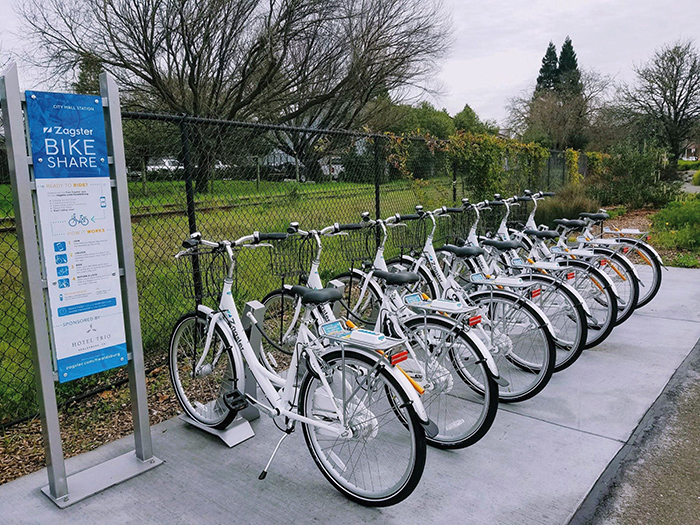
When things opened up from COVID isolation, many thought it was a good idea to bring back the idea of bike sharing. So the concept is being revived and improved, and as soon as later this month a fleet of blue Class 1 pedal-assist electric bikes will be rolled out, available for short-term rental to anyone over 18 who has the app.
On Sept. 19, the city allocated up to $290,000 (most of it from a federal Quick Strike grant) for a new bike share contract with Bird Global, and a week later Bird rep Mike Covato showed up at the Plaza to introduce their powder-blue bike to residents (he called the color “electric sky blue,” a company branding).
Covato explained the characteristics of the stylish bike at the Healdsburg Plaza. “It’s a little bit more robust, to be able to survive the wear and tear that you would anticipate (from shared use),” he said. Features include a dual brake system, fenders to keep road debris off the user’s clothes, a bell on the handlebars, and always-on headlights and taillights.
Most appealing is the scooter-style access—there’s no center rail to struggle over, but a low step between seat and steering system that makes it easy to mount (more like a Vespa than a Schwinn). The seat is soft and adjustable, the handle grips are padded, and there’s a basket mounted over the front wheel for carrying a purse or farmers’ market shopping bag.
“All an individual has to do is download the Bird app, scan the QR code to unlock the bike and take it where you need to go,” said Covato. “At the end of your ride, you’ll be prompted to take a photograph to prove that you parked it appropriately before the rental is confirmed and you receive a receipt.”
Helmets are “actively encouraged,” said Covato, who was passing out free bike helmets at the Plaza last week. (California state law requires anyone under 18 to wear a helmet when riding bikes, scooters, skateboards or inline roller skates.)
The Bird app is available for either Android or iOS in 18 languages, with local maps and pins marking bike share stations within range of the user’s cell phone. It can be preloaded to pay for the user’s rides. It will also locate Bird bikes (or scooters, where available) in the area. Users of the app can also receive a free helmet (only paying for shipping), as well as safety tips, promotions and other features.
Pioneer in micro-mobility
The concept of urban “last-mile” or micro-mobility is not entirely new—that’s the market targeted by Segway over 20 years ago and more successfully in the last half-dozen by Bird, Lime and others. Many communities have the simpler foot-powered e-scooter systems; in fact, the City of Santa Rosa in May approved a year-long pilot program with Bird for e-scooters, as Windsor did in April.
The original Zagster contract with Healdsburg, which began in 2018, set up seven bike exchange stations in the downtown area, and now the city plans to build on that pre-existing network with additional stations in farther-ranging locations. That would make Healdsburg the first e-bike share system in the county, said Councilmember Ariel Kelley, who was crucial in bringing the program to Healdsburg when she served as a director of the Sonoma County Transportation Authority (SCTA) last year.
“I advocated that this project be funded due to it being able to move quickly (as was a requirement of the ‘Quick Strike’ grant),” said Kelley, because the existing network of former Zagster stations made the conversion to an e-bike vendor relatively rapid and simple. The city was awarded the $250,000 grant last year, budgeted an additional $40,000 this year, and ultimately approved the contract with Bird Rides Inc. for a three-year trial program on Sept. 19.
The cost of the bike rental is modest—a dollar fee, plus a set amount per commuting mile ridden. A sample rate shows Healdsburg riders pay rates of $1.46 a mile, compared to Bird’s standard of $2.92. Additional discounts for seniors, people on fixed incomes, students and veterans are also included in the city’s contract with Bird Rides.
The Bird bike has a built-in geo-sensing program, to track the location (and miles traveled) of each bike. The program can even control the bike to some degree, such as reducing its top speed (from 15 mph) to a slower rate in pedestrian zones or, if it’s taken outside the contracted jurisdiction altogether, to disable acceleration—and encourage the rider to return to the service area.
Rough patches in the road
During the Sept. 19 City Council meeting, several citizens raised objections in public comment, such as saying that riding bikes is too dangerous in town as it is, without adding more bikes or at the very least bike lanes to accommodate them.
Larry Zimmer, the city’s director of transportation and public works, acknowledged that there were no infrastructure improvements in the contract with Bird, but that such improvements are ongoing as part of the bicycle master plan. “It’s a limited amount of funds, and there’s only so much we can do. But I feel we’ve been making great strides,” with both bike and pedestrian projects planned over the next five years, with a “significant amount of money dedicated to them.”
One such is the Healdsburg Avenue Improvement Project, now authorized to start design plans and eligible for $12 million in grants to build, among other avenue enhancements, protected bike lanes from Powell Avenue to the northern city limits. “We are very hopeful that we receive that full amount this year,” Zimmer said, if not as soon as October, then in a second round of grants later in the year.
The week in Healdsburg was a newsworthy one for Bird as well—on Sept. 22, company founder Travis VanderZanden (who formerly worked with both Uber and Lyft) was replaced as CEO by Shane Torchiana in the wake of poor performance by the publicly-traded stock. They also lost their home city of Santa Monica as a customer for their e-scooters, though 2022 has seen a number of new contracts with other cities in California, Oregon and Washington.
Robert Singleton, who represented Bird in their negotiations with Healdsburg, put a positive spin on the restructure by pointing out that Torchiania has been the lead on city relationships for the past year. “The fact that we are putting the head of the folks who most care about the needs of our core customers I think is a step to making sure that it is front and center in all of our future business,” he told the Tribune.
The city council was favorably disposed toward the plan, and appreciated its local benefits. “It’s exciting to see programming that typically happens in larger cities, in urban cities, come to rural communities like ours,” said Mayor Ozzy Jiménez. “I think it’s great as a young person to see that. It’s also great getting folks on bikes to reduce green-house gas emissions.”The three-year pilot program with Bird will become available in late October or early November, with between 50 and 100 bikes allocated for the streets of Healdsburg, depending on maintenance, charging and seasonality, said Singleton.


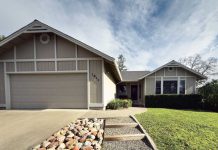
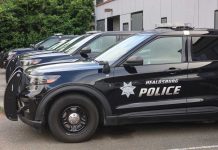
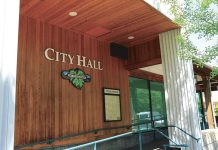




These pieces of junk are a hazard and eyesore. They are left everywhere, blocking sidewalks and driveways all over town. Ther are not an environmental benefit. Any trip by these pieces of junk could be made walking. To make matters worse some guy in a large diesel truck has to drive around and retrieve them. Shame on you for spending any money on this joke.